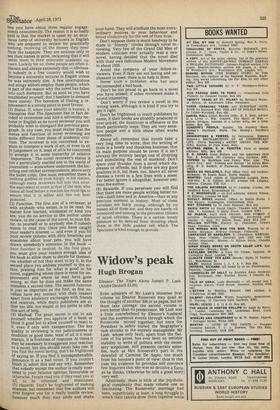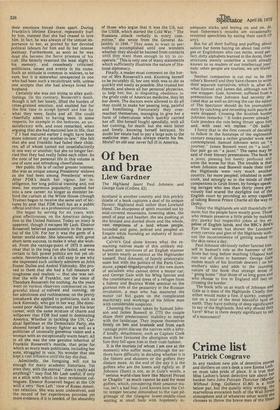Widow's peak
Hugh Brogan
Eleanor: The Years Alone Joseph P. Lash (Andre Deutsch 0.50) Even admirers of Mr Lash's immense first volume on Eleanor Roosevelt may quail at the thought of another 300 or so pages, but let them take courage: the second volume is even better than its predecessor. Mr Lash was a little overwhelmed by Eleanor's husband and the enormous events through which the Roosevelts moved together; but once the President is safely buried the biographer's task shrinks to the entirely manageable. Mr Lash, whose only fault, apart from the flatness of his prose, has ever been an amiable inability to write of politics with the necessary scepticism, still presents certain episodes, such as Mrs Roosevelt's part in the downfall of Carmine De Sapio, too much from his heroine's point of view: thus in this case the evidence he provides will convince few inquirers that she was so decisive a force, as he thinks. Otherwise he tells a good story very well.
Admittedly, there is little of the psychological complexity that made volume one so fascinating. The Roosevelts' marriage had been, superficially at least, a long struggle in which their talents drew them together while their emotions forced them apart. During Franklin's lifetime Eleanor, repeatedly hurt by him, insisted that she had ceased to love him. In fact, he was always of the utmost im portance to her, as proved by her devoted political labo.urs for him and by her intense jealousy. Furthermore, as soon as he was dead she became the fierce priestess of his cult. She bitterly resented the least slight to his memory, and ceaselessly criticised politicians, issues and events in his name. Such an attitude is common in widows, to be sure, but it is somewhat unexpected in one who had been such a recalcitrant wife, unless one accepts that she had always loved her husband.
Certainly she was not trying to allay guiltfeelings. On the contrary, Roosevelt's death, though it left her lonely, lifted the burden of cross-grained emotion, and enabled her for the first time to accept herself and him for what they were, faults and all. She could cheerfully admit to having been in some respects, for example in the bedroom, an unsatisfactory wife, and once remarked, when arguing that she had matured late in life, that "if I had matured earlier I might have been more tolerant of my mother-in-law." She felt that she and Franklin had failed their children, all of whom turned out unsatisfactorily in one way or another; but she no longer fancied that they had really failed each other. So the note of her personal life in this volume is one of sane and refreshing cheerfulness.
Her public life is of rather greater interest. She was as unique among Presidents' widows as she had been among Presidents' wives. After FDR's death her vigour, her intelligence, her long political training and, not least, her enormous popularity, pushed her into a new career: no longer as minister behind the curtain at the White House (though Truman began to receive the same sort of lectures by post that FDR had) but as a public official and then as a professional politician.
She began by serving for six years, with great effectiveness, on the American delegation to the United Nations. Today an irony is apparent, though it escapes Mr Lash. Eleanor Roosevelt believed passionately in the potential of the UN. For her it was the germ of a better world-order. She laboured, with great short-term success, to make it what she wished. From the vantage-point of 1973 it seems clear that in the long run she failed, and was certain to fail: power politics are not yet obsolete. Nevertheless it is still easy to see why she impressed such unlikely admirers as John Foster Dulles and Andrei Vishinsky. She proved to them that she had a full measure of toughness and realism — that she was neither the wife of Franklin, nor the niece of Theodore Roosevelt for nothing. As the years went on various observers commented on her graceful blend of naiveté and cunning; on her adroitness and ruthlessness; on the pretty tomahawk she applied to politicians, such as Jack Kennedy, who got in her way. She dominated poor Adlai Stevenson, and ran his later career, with the same mixture of charm and willpower that FDR had used in dominating America, Whether in tackling the UN, Cardinal Spellman or the Democratic Party, she showed herself a bonny fighter as well as a politician of unusually generous vision and a woman with an exceptionally warm heart. All in all she was the one genuine inheritor of Franklin Roosevelt's mantle, that prize for which so many male politicians, including her sons, struggled in vain. No wonder that she kept a vast influence until the day she died.
Admittedly, the foregoing will not be enough for many academic historians. Yet even they, with the eternal "does it really add anything?" may find Mr Lash useful, if only as a stick with which to beat revisionist col leagues. Eleanor Roosevelt began at the UN
with a very' New Left' view of Russo-American relations. She was soon undeceived, and
the record of her experiences provides yet more evidence, if it is needed, of the absurdity of those who argue that it was the US, not the USSR, which started the Cold War. "The Russians attack verbally in every committee," she wrote from the General Assembly in 1948. "They seem to want to see! nothing accomplished until one wonders whether they should be banned from contacts until they want them enough to try to cooperate." This is only one of many statements which sufficiently illustrate the nature of Stalinist diplomacy.
Finally, a reader must comment on the horror of Mrs Roosevelt's end. Knowing herself to be incurably ill, her one wish was to die as quickly and easily as possible. She trusted her friends, and above all her personal physician, to help her; but, in disgusting obedience to the grisly code of American medicine, they let her down. The doctors were allowed to do all they could to make her passing long, painful and humiliating. Fortunately they overreached themselves, managing to give her a form of tuberculosis which quickly carried her off. She herself fought spendidly, with all her cunning, for death: but she went bitter and lonely, knowing herself betrayed. No doubt her estate had to pay a large sum to the medicine men: Judas always exacts his fee. Moral? an old one: never fall ill in. America.



































 Previous page
Previous page